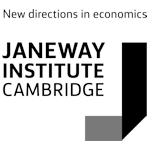'Economics Evolving: Recent Trends and Future Directions', was chaired by Professor Vasco Carvalho, the Director of the Janeway Institute. Panel members were Professor Hélène Rey from LBS, Professor Antoinette Schoar from MIT, Professor Hyun Song Shin from BIS and Professor Joseph Stiglitz from Columbia University.
Professor Antoinette Schoar from MIT Sloan School of Management started the discussion by explaining how the Global Financial Crisis, over a decade ago, impacted the world of finance. She then examined whether it resulted an increase in social good, in other words a resulting increase in awareness of problems and subsequent solutions in the markets provided a tangible benefit to the general public.
She explained that the finance profession received a lot of criticism after the 2008 crisis for being out of touch, and not caring about real-world problems. “Some of the this might not have been justified, simply because people didn’t understand what we work on,” she explained. “However, it is certainly true that we often had little to say about actual solutions, or indeed about policy implementation for financial problems.”
As Professor Schoar explained, “partly that is simply because I would argue that for quite a long time we didn’t focus on topics that are of importance for the broader society such as financial inclusion, regulation of abusive practices, or indeed building financial capabilities. Now we know, answers are only meaningful if you ask the right questions, and we unearth the real underlying problems.”
Following this, Professor Hélène Rey from the London Business School examined the International Finance Climate, and focused on interdependence of countries, regions and currency areas. She argued that as a result of the crisis, economists now think a lot more about the macroeconomic model, and the wider implications of policy for financial stability.
“Despite this, one of the most under researched areas is climate, and biodiversity loss. There is so much research to do, of the first order, in this area,” she said. “There are lots of issues with data, and financial linkages; and there is some extremely important macroeconomic modelling we should be doing in the future.”
Professor Joseph Stiglitz is an American economist at Columbia University. He is also the co-chair of the High-Level Expert Group on the Measurement of Economic Performance and Social Progress at the OECD, and the Chief Economist of the Roosevelt Institute. He examined how academic research into economics has been evolving, and looked at recent developments.
He questioned some of the fundamentals of late twentieth century economics. Starting off by looking at the nature of households and individuals, he said we’ve very much moved from a standard model with rational and exogenous preferences to understanding behaviour economics, with predicable irrationalities.
Professor Stiglitz also looked at the current nature of ‘the firm’ and how companies operate. “We have to examine what is the real objective of the firm. Until recently, we just assumed that they should just maximise shareholder value. However, as way back as the early 1970s the research indicated that didn’t lead to societal wellbeing,” he said. “Today we have a broader perspective, where we look at a company’s value in society. This has huge importance for corporate governance, and the laws that regulate it.”
He also argued that markets are not competitive. “This highlights the importance of rules and regulations. These are how we shape the economy, however because these are set in a political process, we can’t separate politics from economics.”
Hyun Song Shin from the Bank for International Settlements switched back to a macroeconomic lens. As the BIS Economic Adviser, Mr Shin co-leads the Monetary and Economic Department and is part of the bank's senior management as a member of its Executive Committee.
He looked at the mismatch between the financial markets, and what he called the ‘real economy’. He made the point that “what happens in financial markets, doesn’t always stay in financial markets, it has implications for the real economy as well.”
“Fiscal policy has led the way in the policy response to the pandemic, giving rise to large budget deficits, both in advanced and emerging economies,” said Hyun Song Shin. “The deficits are larger in the advanced economies, because they have more fiscal space. However, the emerging market governments have overcome ‘original sin’ – that’s the idea in emerging markets that if they want to borrow from foreigners, they have to borrow in foreign currency. Now, the pandemic means they can borrow from global investors in a domestic currency. It’s a radical change.”
He said it has huge implications for many economies. “However, overcoming ‘original sin’ has not been a panacea in securing policy space. Instead, portfolio flows in local currency sovereign bonds have barely recovered.”
“Policy makers are very focused on this change. It is key now to some financial markets, and indeed it illustrates the importance of the link between financial markets and the real economy, an issue the new Janeway Institute will focus on,” he added.
Professor Stiglitz summed up the feeling of economic research now, as something the Janeway Institute will be looking at, by arguing that what he called the ‘post-neoliberal agenda’ is well positioned to bring together many strands to construct an alternative economic vision.
The panel conversation starts at 38mins58secs









